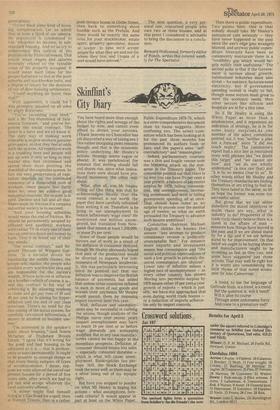Skinflint's City Diary
You have heard more than enough about the rights and wrongs of the. budget by now, and cannot even afford to drown your sorrows. (Thank heavens no Chancellor has yet discovered a way of taxing sex.) One rather intriguing point remains though, and that is the economic policy underlying Mr Healey's actions. Strategy seems vague or absent. It was paradoxical for instance that sterling should fall and shares rise, since what indications there were should have produced movement the other way about.
What, after all, was Mr Healey telling us? One thing was that he acknowledges finally that the social contract is not worth the paper they have carefully refrained from writing it on. Therefore is he going to use unemployment to reduce inflationary wage rises? He mentioned one million unemployed, but translated from Newspeak that means at least 1,250,000, or some 51/2 per cent.
Some of these people would be thrown out of work as a result of the deflation in consumer demand, though Mr Healey obviously hoped that part of the production would be diverted to exports. For connoisseurs of Newspeak incidentally, this was particularly interesting since he pointed out that our deflation was to improve the British balance of payments, but added that unless other countries inflated to suck in more of our goods and worsen their payments Mr Healey would punish them by imposing import controls later this year.
Well, deflation and unemployment may be successful in curbing the unions, though analysts of the Phillips curve over recent years suspect unemployment may have to reach 10 per cent or so before wage demands are noticeably modified. But in any case manufacturers cannot be too happy at the immediate prospects. Deflation of consumer demand means less sales — especially consumer durables — which is what will cause unemployment. Bankruptcies too perhaps. Still, the Stock Exchange took the news well, so there may be a silver lining out of my myopic sight.
But have you stopped to ponder on what Mr Healey is basing his actions — what assumptions, forecasts criteria? It would appear in part at least on the White Paper, Public Expenditure 1978-79, which is a more comprehensive document than its name suggests. More confusing too. The select committee which has been looking at it for the past three months has pronounced its authors fools or liars, and the paper's aims "selfcontradictory" and "meaningless".
Indeed, parliamentary courtesy was a thin and fragile veneer over the blistering attack on the nonsense in the Treasury paper. The committee pointed out that there is no way you can have 31/2 per cent a year growth, a balance of payments surplus by 1979, falling consumption, less unemployment, increasing investment, and level or falling government spending all at once. That should have come as no surprise to anyone over the mental age of twelve, so what on earth persuaded the Treasury to advance such bizarre ambitious?
Committee chairman Michael English thinks he knows the answer: "any attempt to produce consistency reveals a politically unacceptable fact." For instance more exports and investment means less consumption and "the social and political repercussions of such a low growth in privately-financed consumption are obvious". Lower rate of inflation means a higher rate of unemployment — as every other country has shown. Moving into payments surplus by 1979 means either 10 per cent a year growth of exports — which is just silly, we have not approached that . even during world trade booms — or a reduction of imports achievable only by import controls. Then there is public expenditure. Two points here. One is that nobody should take Mr Healey's announced cuts seriously — they have never happened in the past since the axe's edge gets strangely blunted, and anyway public expenditure forecasts have been so consistently inaccurate there is a "credibility gap which would largely nullify their usefulness." The second point is that if the Government is serious about growth, nationalised industries must also invest — for instance, factories need electricity, but if government spending overall is really to fall, though some sectors must grow to meet the economic needs, then other sectors like schools and hospitals are in for a thin time.
So if Mr Healey is using the White Paper as more than a smokescreen, and it represents an indication of strategy, he is in for some nasty surprises.As one member of the select committee pointed out it was "neither a plan nor a forecast" since "it did not touch reality". The committee's report had a nice line in restrained irony with phrases like "we doubt this target" and "we cannot see how" and "we do not wholly understand" (a nice one that) and "it is by no means clear to us". In other words either Mr Healey and the Treasury mandarins are fooling themselves or are trying to fool us. They have failed in the latter, so let us hope the former was none too successful either.
But given that we can either disbelieve the stated objectives or doubt there are any, what is industry to do? Proponents of the trade cycle theory believe there is a trend in the affairs of man — measure how things have moved in the past and if we are ahead stand by for a dip and if we are behind stand by for improvement. On that belief we ought to be buying shares and manufacturers ought to be investing as fast as they can, and some have suggested just those actions. That may well be right but it is worth also remembering the little rhyme of that noted economist Sir Alec Cairncross:










































 Previous page
Previous page